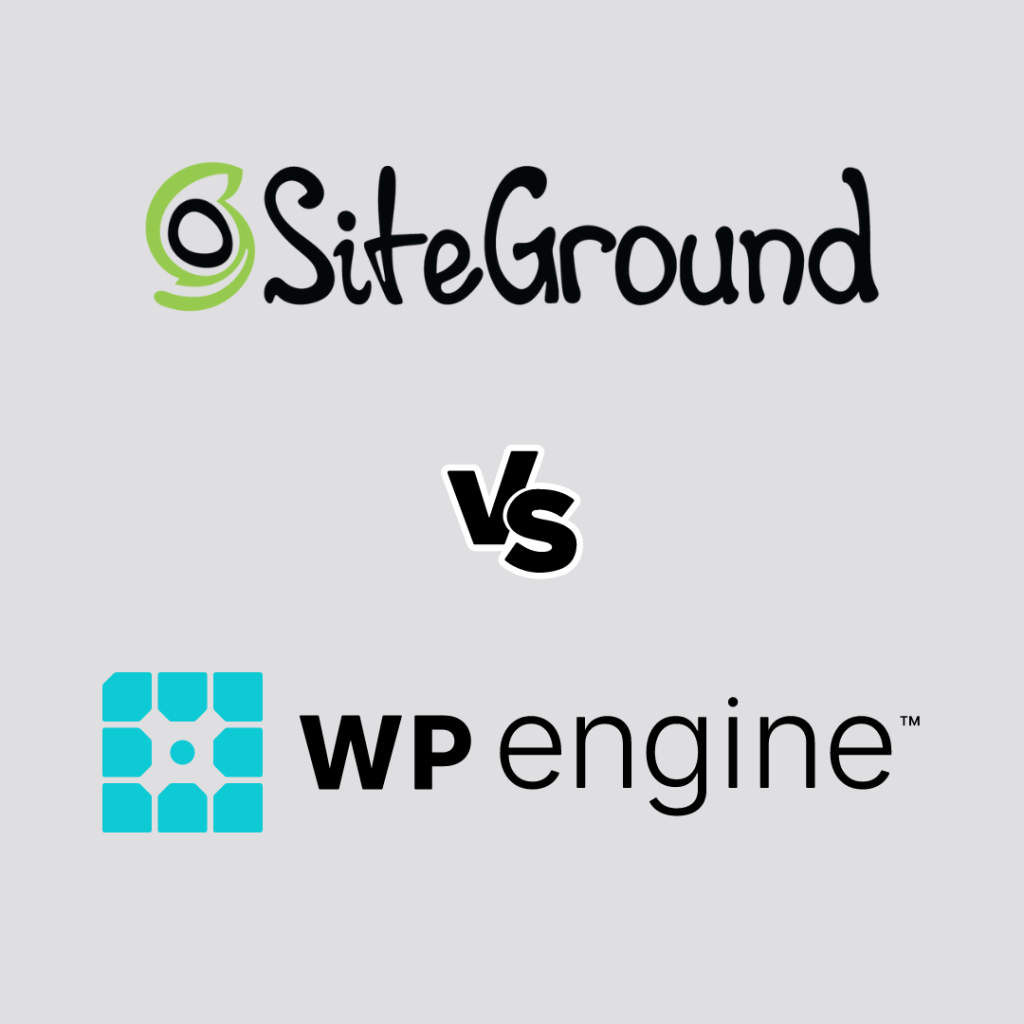Choosing the right web hosting service is crucial for the success of your online business. Among the many hosting providers available, WP Engine and SiteGround stand out for their reliability, speed, and excellent customer service. But how do you decide which one is right for you? In this comprehensive review, we’ll compare WP Engine and SiteGround to help you make an informed decision based on your business idea, goals, and experience level.
Overview of WP Engine and SiteGround
WP Engine
WP Engine is a premium managed WordPress hosting service known for its speed, security, and excellent customer support. It’s specifically designed for WordPress websites and offers advanced features like automated backups, one-click restores, and a staging environment. However, it comes at a higher price point, making it suitable for businesses that prioritize performance and have a budget to match.
SiteGround
SiteGround is a versatile web hosting provider that offers shared, cloud, and dedicated hosting. While it supports various platforms, it is particularly popular for its WordPress hosting. SiteGround is known for its excellent customer service, speed, and affordability, making it a great choice for small to medium-sized businesses.
Features Comparison
Let’s dive into a detailed comparison of WP Engine and SiteGround based on key features:
| Feature | WP Engine | SiteGround |
|---|---|---|
| Hosting Type | Managed WordPress hosting only | Shared, Cloud, Dedicated, and WordPress hosting |
| Performance | High performance with built-in caching and CDN, optimized for WordPress | Solid performance with SuperCacher technology, built-in caching, and free CDN |
| Uptime Guarantee | 99.95% | 99.99% |
| Security | Advanced security features, daily malware scans, automatic updates, and SSL certificates | Free daily backups, anti-hack systems, SSL certificates, and proactive security patches |
| Scalability | Scalable plans suitable for high-traffic websites and enterprise solutions | Scalable through cloud hosting and higher-tier plans |
| Ease of Use | Easy-to-use with a custom dashboard designed for WordPress | User-friendly cPanel and Site Tools for all levels of experience |
| Customer Support | 24/7 premium support via chat, phone, and ticket system; WordPress experts available | 24/7 support via chat, phone, and ticket system; highly rated for customer service |
| Pricing | Starts at $25/month for basic plans, higher tiers available for large sites | Starts at $3.99/month for shared hosting, competitive pricing for cloud and dedicated hosting |
| Staging Environment | One-click staging environment for testing and development | Staging available on higher-tier plans |
| Backups | Automated daily backups with one-click restore | Daily backups included, with on-demand backups available on higher-tier plans |
| Free Migrations | Yes, includes a migration plugin for easy transfers | Yes, with free site migration on all plans |
| Extra Features | Genesis Framework, StudioPress themes included, dedicated WordPress support | Free daily backups, email accounts, and a free CDN on all plans |
Pros and Cons
To make the decision easier, here’s a breakdown of the pros and cons for each hosting provider:
WP Engine
| Pros | Cons |
|---|---|
| High-performance hosting tailored for WordPress | Higher price point compared to other hosting providers |
| Excellent customer support with WordPress-specific expertise | Limited to WordPress sites only |
| Advanced security features and daily backups | No email hosting included |
| One-click staging and development environments | Extra charges for exceeding bandwidth limits |
| Access to premium WordPress themes via StudioPress | Not ideal for beginners with small budgets |
SiteGround
| Pros | Cons |
|---|---|
| Affordable plans with a range of hosting options | Limited storage on lower-tier plans |
| Excellent customer support with high satisfaction ratings | Prices increase significantly after the initial term |
| Suitable for all levels of experience, from beginners to advanced users | Staging environment available only on higher-tier plans |
| Free daily backups and SSL certificates included | SiteGround has fewer advanced features compared to WP Engine’s premium plans |
| Versatile, supporting various platforms, not just WordPress | Not as specialized in WordPress as WP Engine, leading to slightly less optimized performance for WordPress |
Who Should Choose WP Engine?
WP Engine is an ideal choice if:
- You run a high-traffic WordPress site: If your business relies heavily on WordPress and needs a robust platform that can handle high traffic, WP Engine’s performance and scalability are unmatched.
- You prioritize security and uptime: WP Engine offers enterprise-level security features, making it suitable for businesses handling sensitive information.
- You have a higher budget: WP Engine’s premium features come at a cost, so it’s best for those who are willing to invest in their hosting.
Example:
A digital marketing agency with multiple high-traffic WordPress sites would benefit from WP Engine’s robust infrastructure and WordPress-specific features, ensuring optimal performance and security.
Who Should Choose SiteGround?
SiteGround is a great option if:
- You’re a small to medium-sized business: SiteGround offers affordable plans with excellent performance, making it a solid choice for growing businesses.
- You value customer support: SiteGround is renowned for its top-notch customer service, which is particularly beneficial if you’re new to web hosting.
- You need versatility: If you’re running different types of websites or platforms, SiteGround’s range of hosting options allows for greater flexibility.
Example:
A startup or small business owner looking to host a website, blog, or online store would find SiteGround’s affordable and versatile hosting plans ideal for their needs.
FAQs
1. Which hosting service is better for WordPress?
- WP Engine is specifically designed for WordPress, offering superior performance, security, and WordPress-specific features. If WordPress is your primary platform, WP Engine is the better choice.
2. Is SiteGround suitable for e-commerce sites?
- Yes, SiteGround offers features like free SSL, daily backups, and solid performance, making it a reliable choice for e-commerce sites, especially for small to medium-sized stores.
3. Does WP Engine offer email hosting?
- No, WP Engine does not include email hosting. You’ll need to use a third-party service for email accounts.
4. Can I switch from SiteGround to WP Engine or vice versa?
- Yes, both hosting providers offer migration services, allowing you to switch between them without much hassle.
5. Which is more beginner-friendly?
- SiteGround is more beginner-friendly due to its affordable plans, versatile hosting options, and excellent customer support. WP Engine is more advanced, catering to those with specific WordPress needs.
Conclusion
When choosing between WP Engine and SiteGround, your decision should be guided by your specific needs and goals. WP Engine excels in providing high-performance, secure hosting for WordPress sites, making it ideal for larger businesses or those with more significant traffic demands. On the other hand, SiteGround offers a more versatile and affordable solution, perfect for small to medium-sized businesses or those running a variety of websites.
Ultimately, if you’re looking for premium WordPress hosting with top-tier performance, WP Engine is your go-to. If you need an affordable, flexible hosting provider with excellent customer service, SiteGround is a fantastic option.



